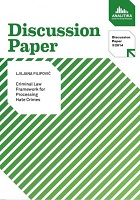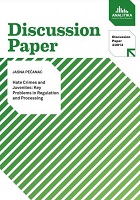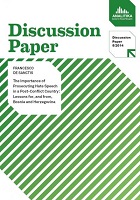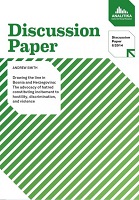Hate Crimes and Juveniles: Key Problems in Regulation and Processing
Author(s): Jasna Pećanac / Language(s): English
Keywords: BiH; hate crimes; juveniles; key problems; regulation; processing; penal policy;
Bosnia and Herzegovina has seen an increase in significance assigned to combating hate crimes. These crimes have a particularly strong impact on our society due to the still present traces of war and the great importance accorded to ethnic, religious and national affiliation in our social and political life. Even though the international community used to devote most of its attention to war crimes, organised crime, corruption, money laundering and the like, in the past few years, the OSCE Mission in Bosnia and Herzegovina, in cooperation with civil society organisations, has taken on a leading role in an endeavour to ensure the application of international standards and obligations pertaining to hate crimes in Bosnia and Herzegovina (hereinafter: BiH). In these activities, special categories of perpetrators of these crimes, such as juvenile offenders, are quite justifiably, but still insufficiently, taken into account. Thus the 2009 Country Overview of Bias-Motivated Incidents in Bosnia and Herzegovina, among other things, points out hate crimes committed by juveniles and young adults. Five such cases are cited for the territory of the Federation of BiH (hereinafter: FBiH). However, in view of the general trend of insufficient and inadequate processing of criminal offences of this type in BiH general, we must conclude that their number is probably considerably higher. In general, juvenile delinquency entails prohibited behaviour through which juveniles endanger and violate the rights and freedoms of others, cause physical and mental suffering to others, or damage another’s property. The problems generally faced by the juvenile justice system in BiH certainly impact the efficiency of processing hate crimes committed by juveniles. However, given the specificity of the motivation and the consequences, processing juvenile perpetrators of hate crimes has (or should have) a series of specificities that arise from the nature of this type of crime. All bodies participating in proceedings involving juveniles should take into account these specificities in the interest of most fully achieving the aims of such proceedings – re-education, rehabilitation and reintegration of the juvenile in question. Given the still insufficient level of commitment to preventing and combating this specific type of juvenile offending, which has been on the rise in the current socio-political situation in BiH, this paper will focus on dispelling dilemmas and quandaries about whether and to what extent the existing legal framework and basic procedural principles applicable to juveniles in conflict with the law can adequately be applied to hate crimes, with particular reference to the significance of preventive activities applied to juveniles in general, and in particular with respect to these types of criminal offences. Moreover, focusing on juveniles as a specific population, but also as potential perpetrators of hate crimes, which are specific by nature, this paper aims to point out possible problems in the practice of prosecuting juvenile perpetrators of hate crimes. This is, of course, another specific characteristic of combating juvenile offending as a whole and involves complex issues. Therefore, at the present stage of defining initial steps in processing hate crimes, this paper will not and cannot encompass all its aspects, but can hopefully contribute to drawing attention to this important topic in the Bosnian-Herzegovinian context.
More...




